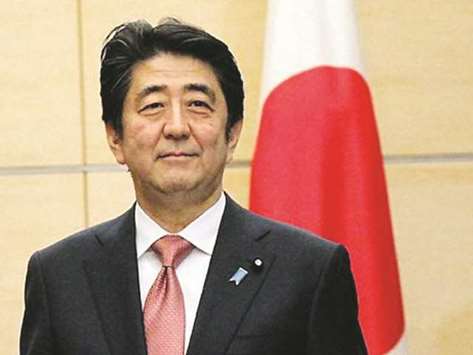Japanese Prime Minister Shinzo Abe yesterday sent a cash donation to a controversial war shrine as the country marked the anniversary of its defeat in World War II.
Yasukuni Shrine honours about 2.5mn dead, mostly Japanese, who perished in the country’s wars since the late 19th century. But it is contentious for also commemorating senior military and political figures convicted of war crimes by an international tribunal.
The indigenous Shinto religious shrine has for decades been a flashpoint for criticism by countries that suffered from Japan’s colonialism and aggression in the first half of the 20th century.
Abe, a staunch nationalist who wants to see Japan’s pacifist constitution amended, visited the shrine in December 2013, but has stayed away since.
His only visit as prime minister sparked fury in China and South Korea, and even earned a diplomatic rebuke from close ally the United States.
A member of Japan’s ruling Liberal Democratic Party (LDP) said Abe had sent the monetary offering this year in his capacity as president of the party, not as prime minister. He made a similar donation last year.
His decision not to attend the shrine again this year comes as Tokyo has sought co-operation with Beijing and Seoul over North Korea’s nuclear and missile programmes. Pyongyang last week threatened to test-fire missiles toward the US Pacific island territory of Guam, after US President Donald Trump warned North Korea of “fire and fury”.
Kim Jong-un, the North Korean leader, said early yesterday he would hold off on the planned missile launch. Masahiko Shibayama, a party aide to Abe who made the donation on his behalf, said at the shrine that it came from Abe’s personal funds. “Upon direction from LDP President Abe, I offered my condolences to the ancestors who sacrificed their lives in the war and reaffirmed my commitment to eternal peace,” Shibayama told reporters.
“President Abe said he’s sorry for not visiting the shrine,” Shibayama said.
Lawmakers, mostly conservative, say pilgrimages to Yasukuni are a chance to console the spirits of the dead and pray for peace. But North and South Korea and China consider them painful reminders of Japanese colonialism and invasion. Though some lawmakers visited the shrine yesterday, Jiji Press reported that no members of Abe’s cabinet went there, the first time that has happened on the anniversary day since he took power in late 2012.
Among members of parliament who prayed at Yasukuni were LDP member and former defence minister Tomomi Inada, noted for her nationalist views. The close Abe ally and onetime protege resigned as defence minister late last month over a scandal at the ministry.
In Beijing, China repeated its longstanding opposition to Yasukuni. “Yasukuni Shrine enshrines and worships Class A war criminals from World War II who have direct responsibility with the war of invasion,” Hua Chunying, a foreign ministry spokeswoman, told reporters at a regular briefing.

Shinzo Abe
